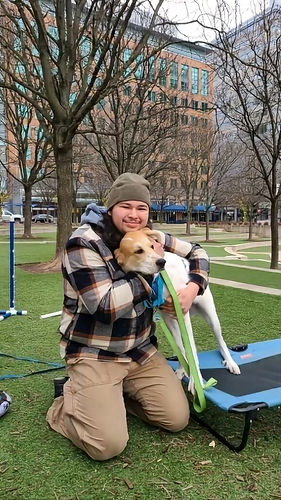


We specialize in counter-reactivity
Your goal is our goal! Through our Reactivity Rehab Program, we provide hands-on training that directly addresses your dog's reactivity towards other dogs, people, and environments. We know how difficult walks and daily life can become when your dog is anxious or reactive. We work with many dog families with similar situations and we understand the challenges reactive dogs can bring. Together, we'll turn these challenges into opportunities, making your walks and home life more enjoyable. Remember that dog training is not magic---it's a process!
What is dog Reactivity?
When owners see their dog pulling, lunging, and barking at other dogs they often label them as aggressive. Some may in fact be aggressive, but most won’t resort to any truly aggressive behaviors. These dogs are afraid or stressed and they’re making it known the best way they know how. We coin these barky-pully friends as reactive. Think of yourself when you see a spider on the wall next to you, or a snake on a gravel path. Simply put, a reactive dog is a dog who displays disorderly symptoms caused by a negative emotional response to another dog, person, bike, child, or other stimulus. Walking your frightened friend can be difficult, frustrating, and isolating. Everyday we see dogs passing by so calmly, meanwhile your dog "Courage" is being a cowardly dog.
What we can do to help?
Improving reactivity is our specialty! Our method offers a positive approach to a negative situation. You’ll learn how to set your dog up for success with safe handling techniques, proper positioning, timing, and threshold management. In doing so, you’ll create opportunities to counter your dog's negative response and begin to replace it with a positive one. Through repetition--we’ll begin to address underlying symptoms that traditional dog training (shock, prong, or chain collars) cannot address; and by the way, we do not use these aversive collars. We strive to serve you and your dog's reactivity conundrum with whatever unique support and information you require.
How long does training take?
Alas, reactivity can be time consuming and there is no clear answer to how long it can take. The amount of time and effort you invest combined with your dogs age, motivation, and level of stress can effect recovery duration. Some dogs speed through rehabilitation while others are the slower tortoise in the race. With this in mind, when you work with dOgBEDIENCE, you do everything we do, training is our shared responsibility. You’ll learn the figurative tools necessary to improve Scooby’s aversion to ghosts and ghouls. When we say goodbye you feel confident in your ability to continue to improve old and new behavior.
